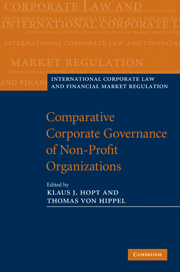Book contents
- Frontmatter
- Contents
- List of contributors
- Preface
- Abbreviations
- PART I Economic findings and theories on nonprofit organizations
- PART II The nonprofit sector: private law, trust law, tax law in selected countries
- PART III The board of nonprofit organizations
- PART IV Good governance of nonprofit organizations: activities and regulatory problems
- 10 Fundraising
- 10.1 The regulation of fund-raising by charities and voluntary organisations in England and Wales
- 10.2 Comparing regulation of fundraising: self-regulation or governmental regulation?
- 11 Asset management in nonprofit organizations
- 12 Nonprofit organizations and economic activities/enterprises
- PART V Good governance of nonprofit organizations: self-regulation, disclosure and supervision
- Index
- References
10.1 - The regulation of fund-raising by charities and voluntary organisations in England and Wales
from 10 - Fundraising
Published online by Cambridge University Press: 05 August 2011
- Frontmatter
- Contents
- List of contributors
- Preface
- Abbreviations
- PART I Economic findings and theories on nonprofit organizations
- PART II The nonprofit sector: private law, trust law, tax law in selected countries
- PART III The board of nonprofit organizations
- PART IV Good governance of nonprofit organizations: activities and regulatory problems
- 10 Fundraising
- 10.1 The regulation of fund-raising by charities and voluntary organisations in England and Wales
- 10.2 Comparing regulation of fundraising: self-regulation or governmental regulation?
- 11 Asset management in nonprofit organizations
- 12 Nonprofit organizations and economic activities/enterprises
- PART V Good governance of nonprofit organizations: self-regulation, disclosure and supervision
- Index
- References
Summary
Introduction
This paper aims to examine the legal regulation in England and Wales of the main areas which can be considered to fall within the ambit of fund-raising.
In 2003–04, the voluntary sector in the United Kingdom generated £26.3 billion in income. Nearly half of this was earned income (for selling goods and services); only slightly less was voluntary income (including grants and donations); and less than 10% was investment income (from dividends and interest receipts). The income of individual charities, however, varies enormously. According to statistics compiled by the National Council for Voluntary Organisations, there were in 2004 some 169,000 active general charities; but, within this total, there is what might be called a ‘super-league’ of just 14 charities, each with an income of more than £100 million per annum. Whilst the number in this super-league comprises merely 0.2% of the total number of charities, it nevertheless generates 10% of the sector's income, and is particularly successful in obtaining donations from the public. Two-thirds of the sector's income is generated by just 3,200 organisations (2% of the total number). At the other end of the scale, more than half of the charities in the United Kingdom (56%) have annual incomes of less than £10,000.
- Type
- Chapter
- Information
- Comparative Corporate Governance of Non-Profit Organizations , pp. 637 - 661Publisher: Cambridge University PressPrint publication year: 2010



